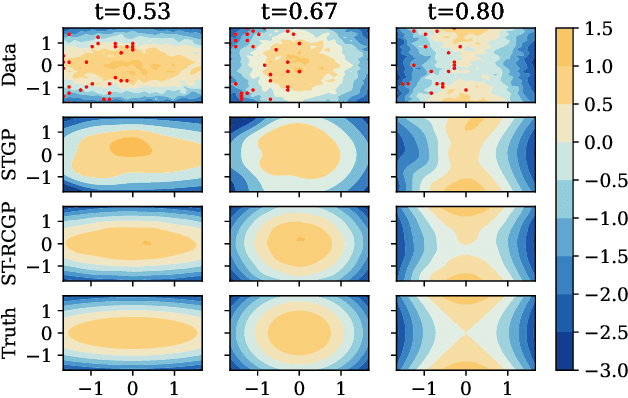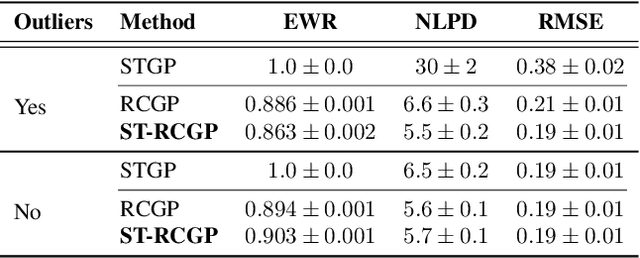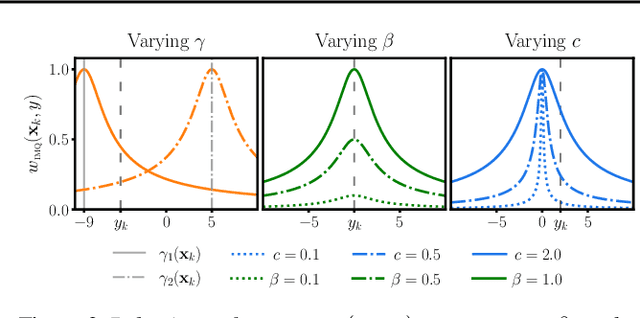Matias Altamirano
Multi-Output Robust and Conjugate Gaussian Processes
Oct 30, 2025Abstract:Multi-output Gaussian process (MOGP) regression allows modelling dependencies among multiple correlated response variables. Similarly to standard Gaussian processes, MOGPs are sensitive to model misspecification and outliers, which can distort predictions within individual outputs. This situation can be further exacerbated by multiple anomalous response variables whose errors propagate due to correlations between outputs. To handle this situation, we extend and generalise the robust and conjugate Gaussian process (RCGP) framework introduced by Altamirano et al. (2024). This results in the multi-output RCGP (MO-RCGP): a provably robust MOGP that is conjugate, and jointly captures correlations across outputs. We thoroughly evaluate our approach through applications in finance and cancer research.
Robust and Conjugate Spatio-Temporal Gaussian Processes
Feb 04, 2025



Abstract:State-space formulations allow for Gaussian process (GP) regression with linear-in-time computational cost in spatio-temporal settings, but performance typically suffers in the presence of outliers. In this paper, we adapt and specialise the robust and conjugate GP (RCGP) framework of Altamirano et al. (2024) to the spatio-temporal setting. In doing so, we obtain an outlier-robust spatio-temporal GP with a computational cost comparable to classical spatio-temporal GPs. We also overcome the three main drawbacks of RCGPs: their unreliable performance when the prior mean is chosen poorly, their lack of reliable uncertainty quantification, and the need to carefully select a hyperparameter by hand. We study our method extensively in finance and weather forecasting applications, demonstrating that it provides a reliable approach to spatio-temporal modelling in the presence of outliers.
Outlier-robust Kalman Filtering through Generalised Bayes
May 09, 2024Abstract:We derive a novel, provably robust, and closed-form Bayesian update rule for online filtering in state-space models in the presence of outliers and misspecified measurement models. Our method combines generalised Bayesian inference with filtering methods such as the extended and ensemble Kalman filter. We use the former to show robustness and the latter to ensure computational efficiency in the case of nonlinear models. Our method matches or outperforms other robust filtering methods (such as those based on variational Bayes) at a much lower computational cost. We show this empirically on a range of filtering problems with outlier measurements, such as object tracking, state estimation in high-dimensional chaotic systems, and online learning of neural networks.
Robust and Conjugate Gaussian Process Regression
Nov 01, 2023Abstract:To enable closed form conditioning, a common assumption in Gaussian process (GP) regression is independent and identically distributed Gaussian observation noise. This strong and simplistic assumption is often violated in practice, which leads to unreliable inferences and uncertainty quantification. Unfortunately, existing methods for robustifying GPs break closed-form conditioning, which makes them less attractive to practitioners and significantly more computationally expensive. In this paper, we demonstrate how to perform provably robust and conjugate Gaussian process (RCGP) regression at virtually no additional cost using generalised Bayesian inference. RCGP is particularly versatile as it enables exact conjugate closed form updates in all settings where standard GPs admit them. To demonstrate its strong empirical performance, we deploy RCGP for problems ranging from Bayesian optimisation to sparse variational Gaussian processes.
Robust and Scalable Bayesian Online Changepoint Detection
Feb 09, 2023Abstract:This paper proposes an online, provably robust, and scalable Bayesian approach for changepoint detection. The resulting algorithm has key advantages over previous work: it provides provable robustness by leveraging the generalised Bayesian perspective, and also addresses the scalability issues of previous attempts. Specifically, the proposed generalised Bayesian formalism leads to conjugate posteriors whose parameters are available in closed form by leveraging diffusion score matching. The resulting algorithm is exact, can be updated through simple algebra, and is more than 10 times faster than its closest competitor.
 Add to Chrome
Add to Chrome Add to Firefox
Add to Firefox Add to Edge
Add to Edge